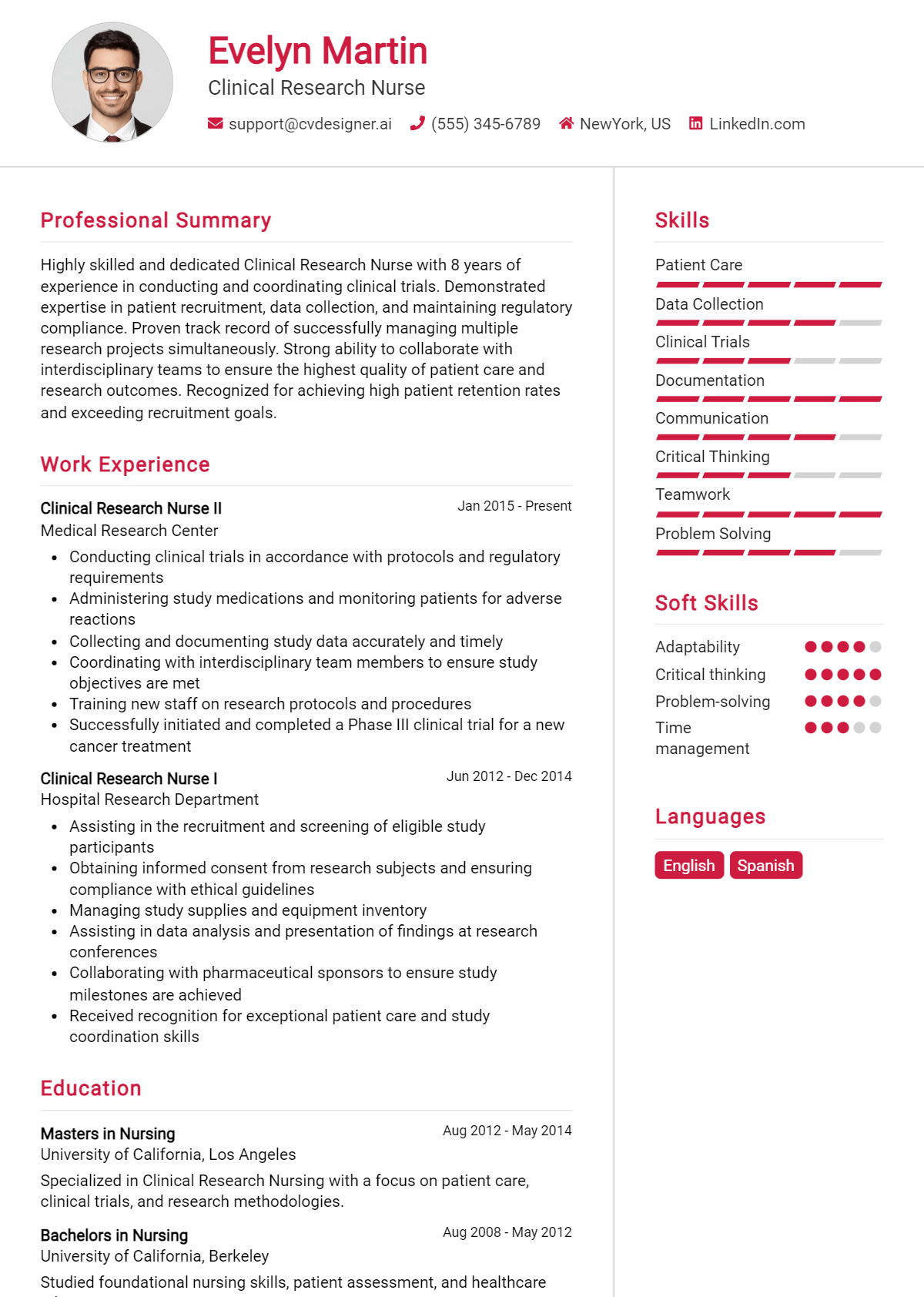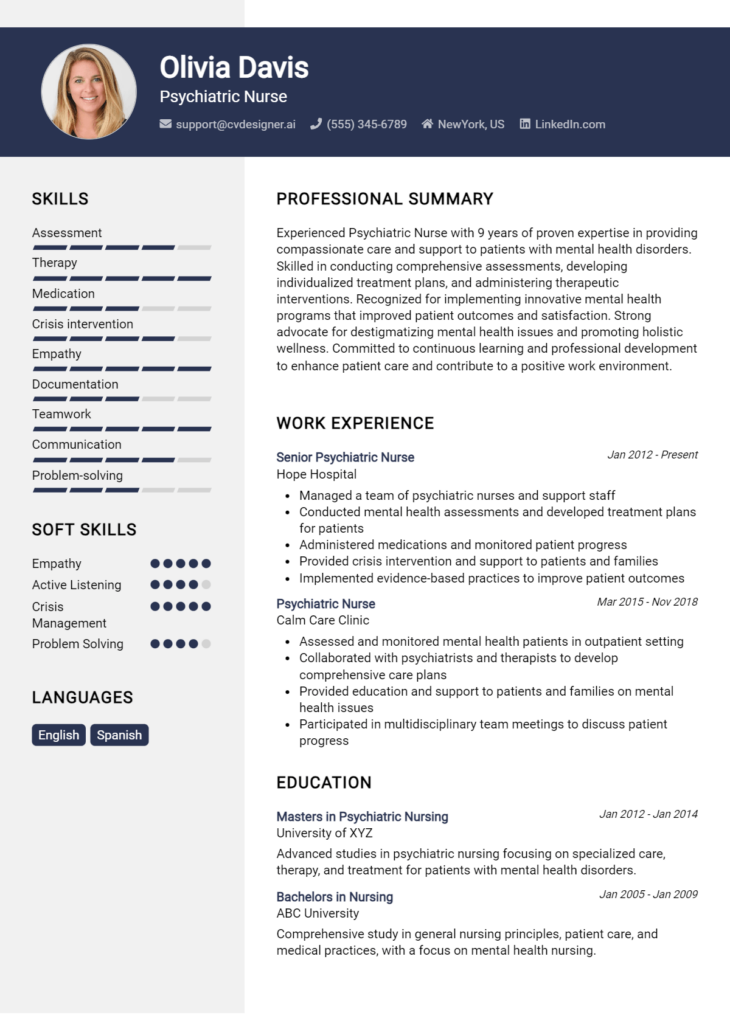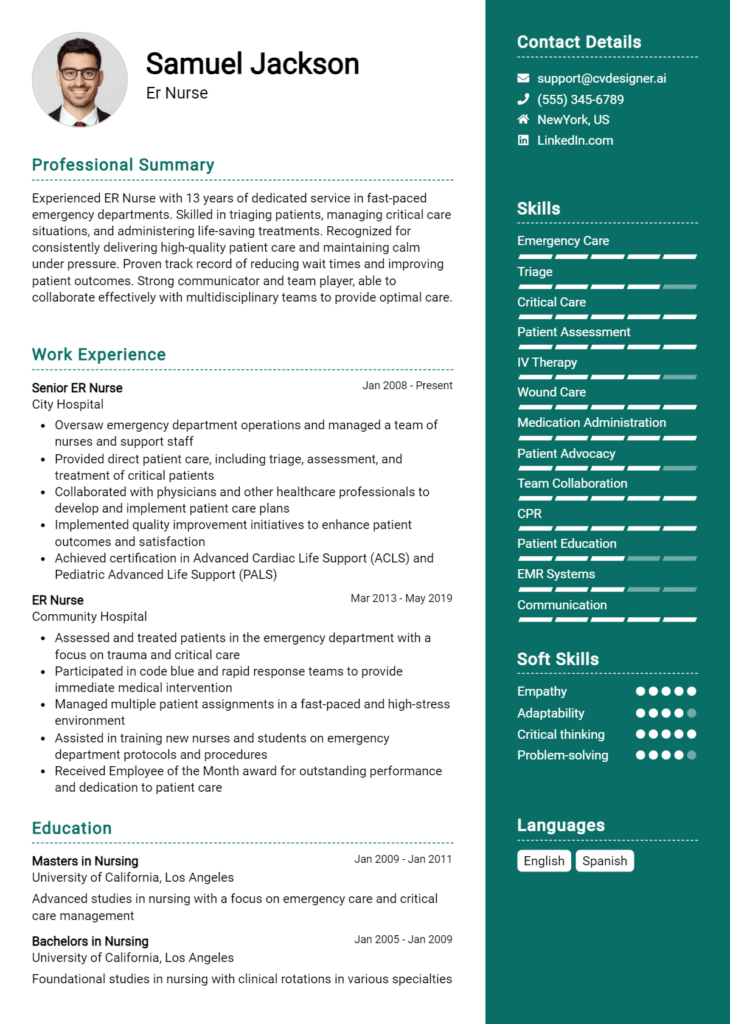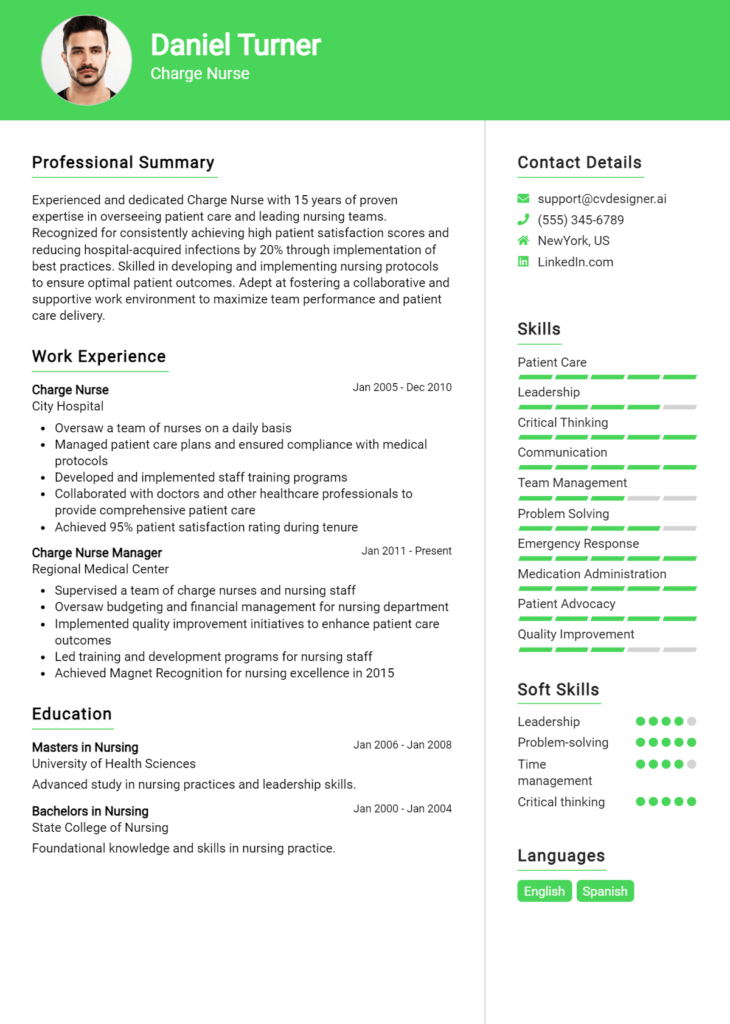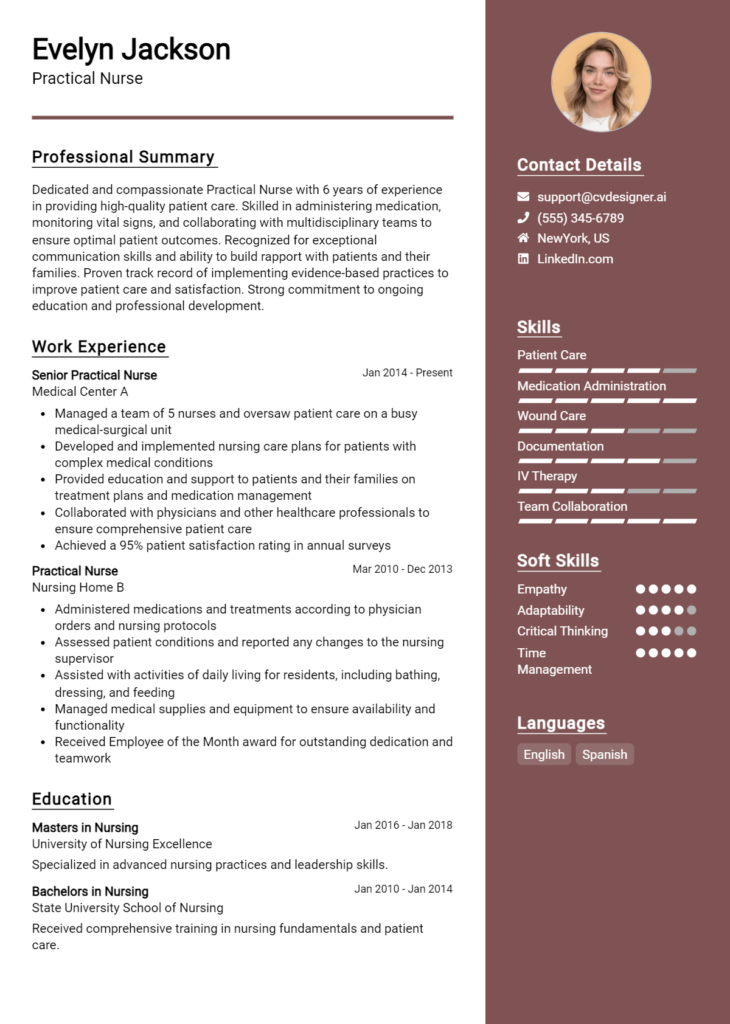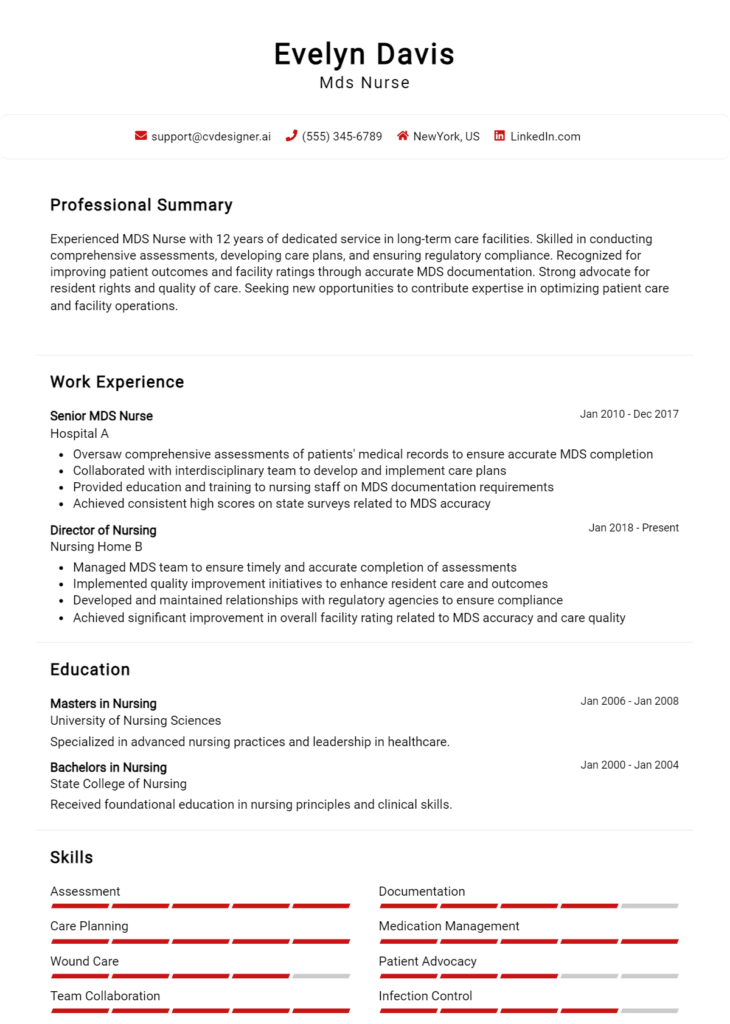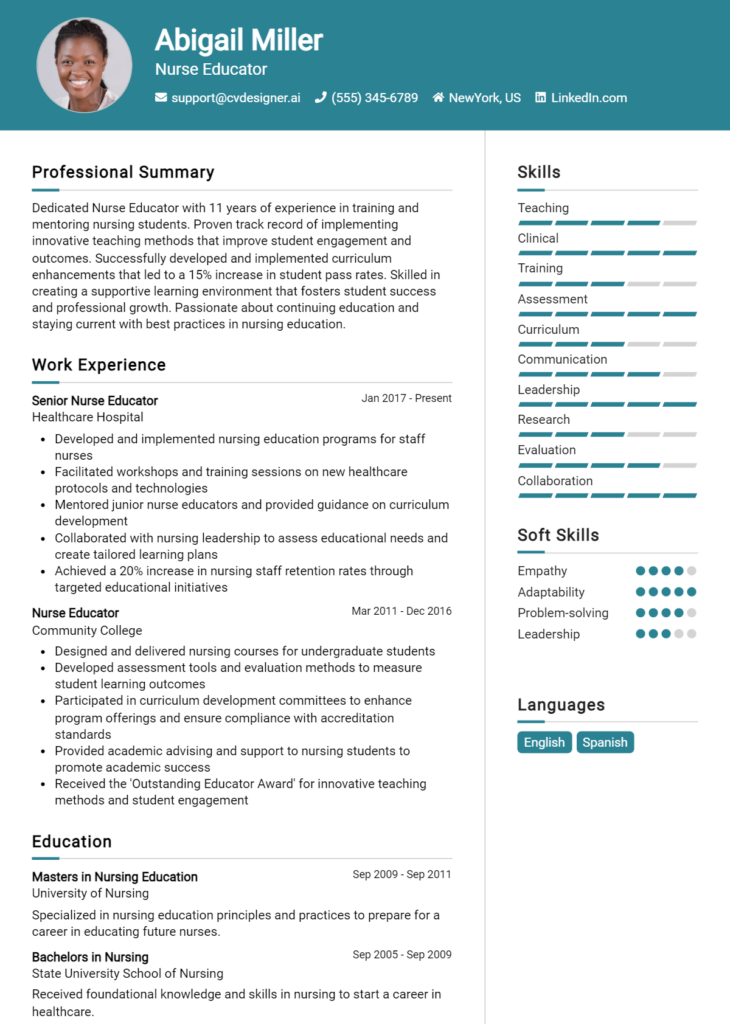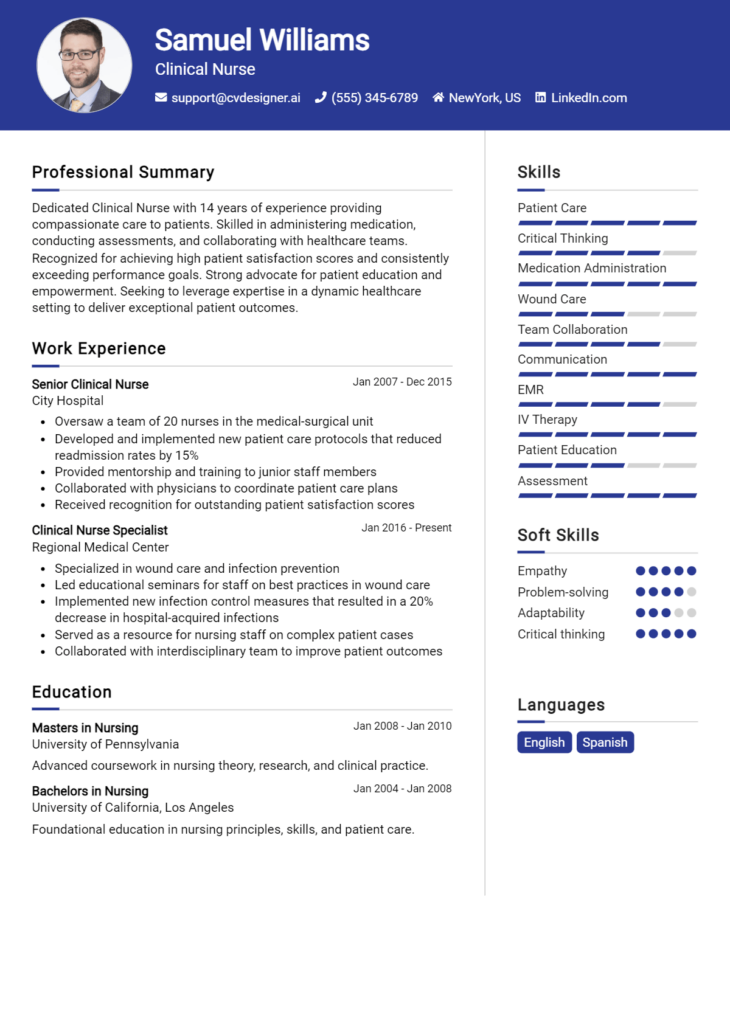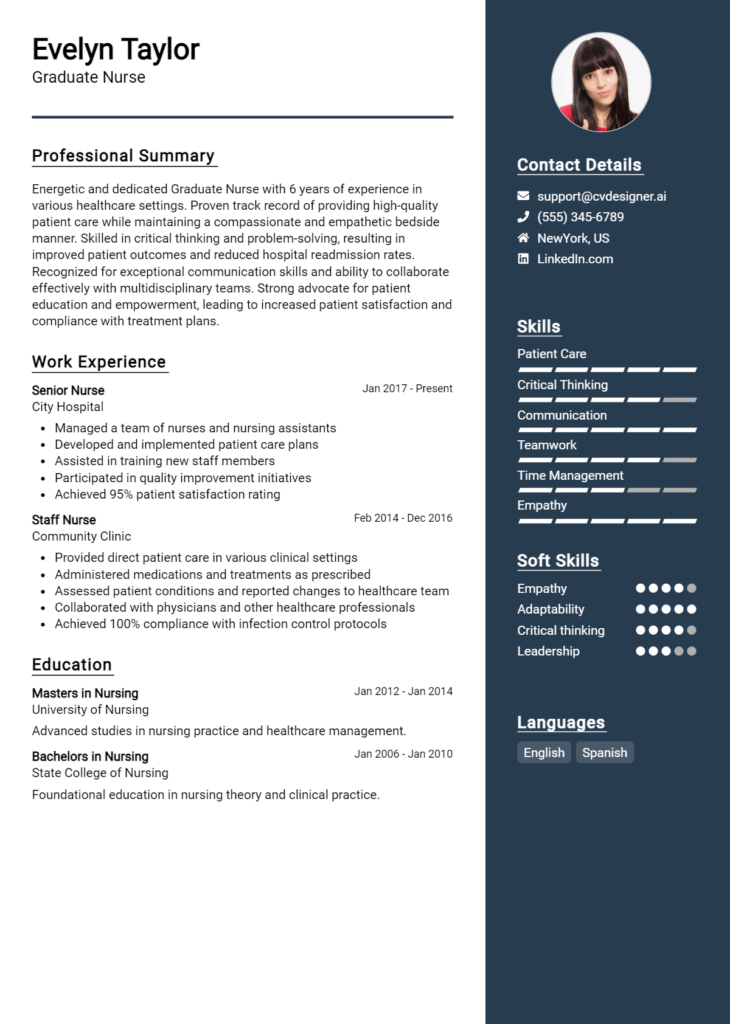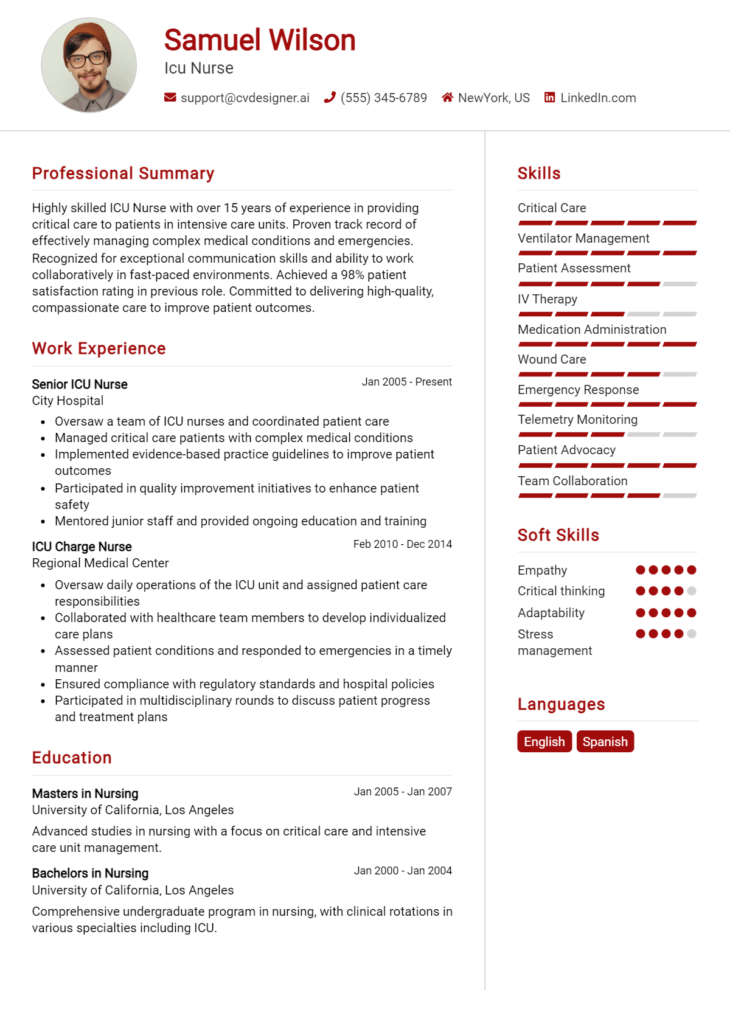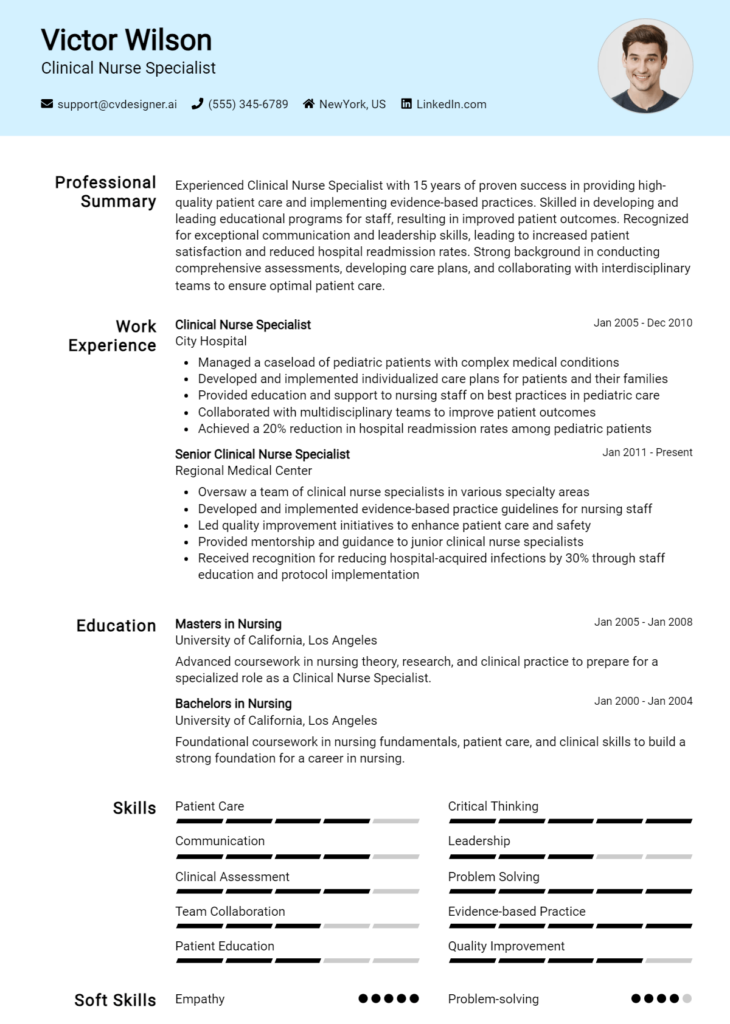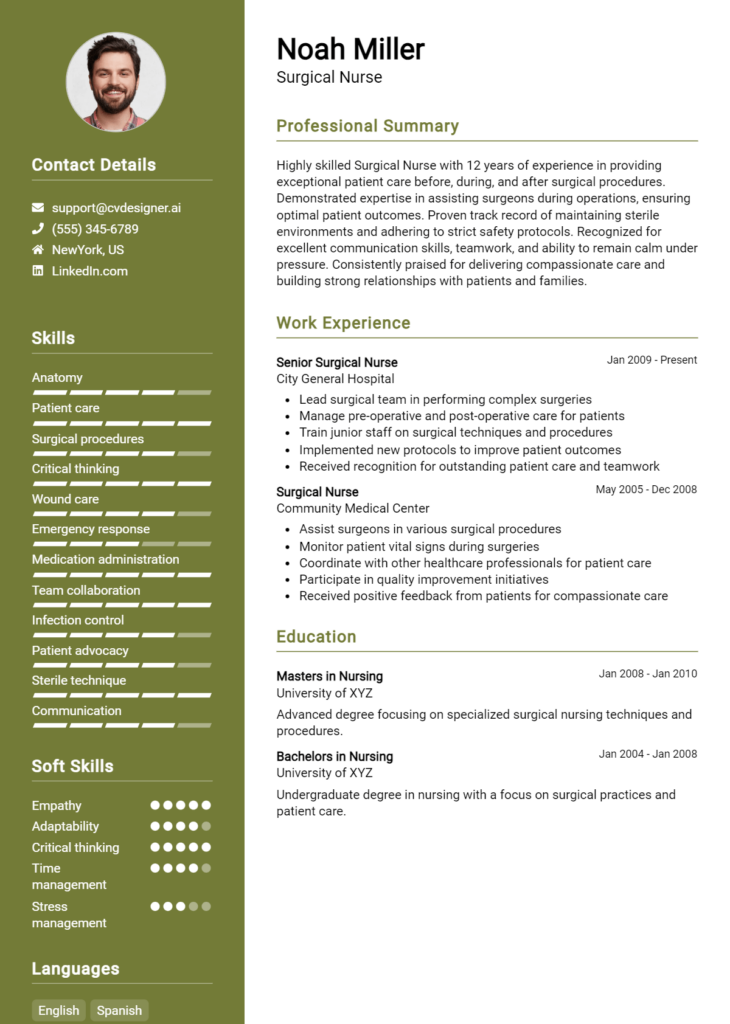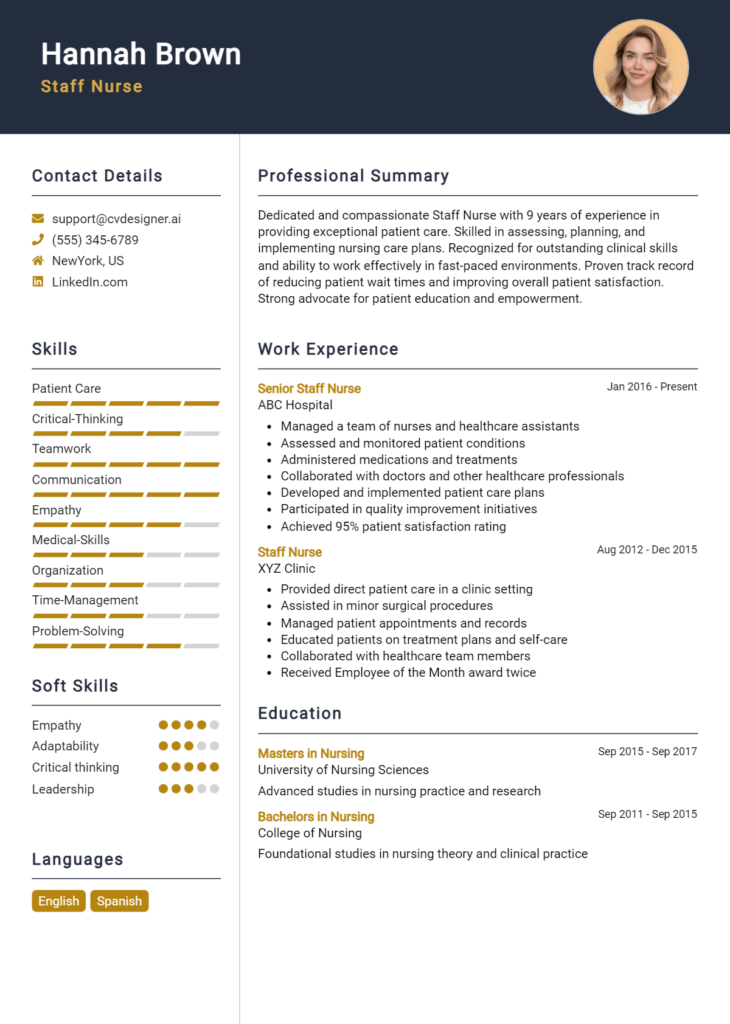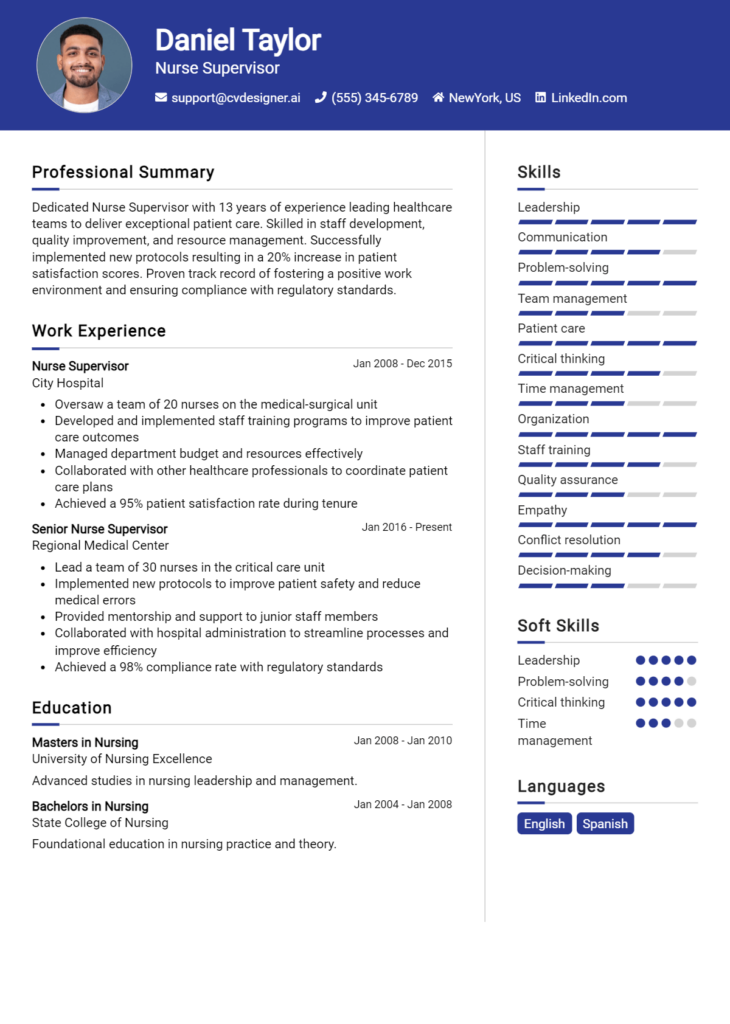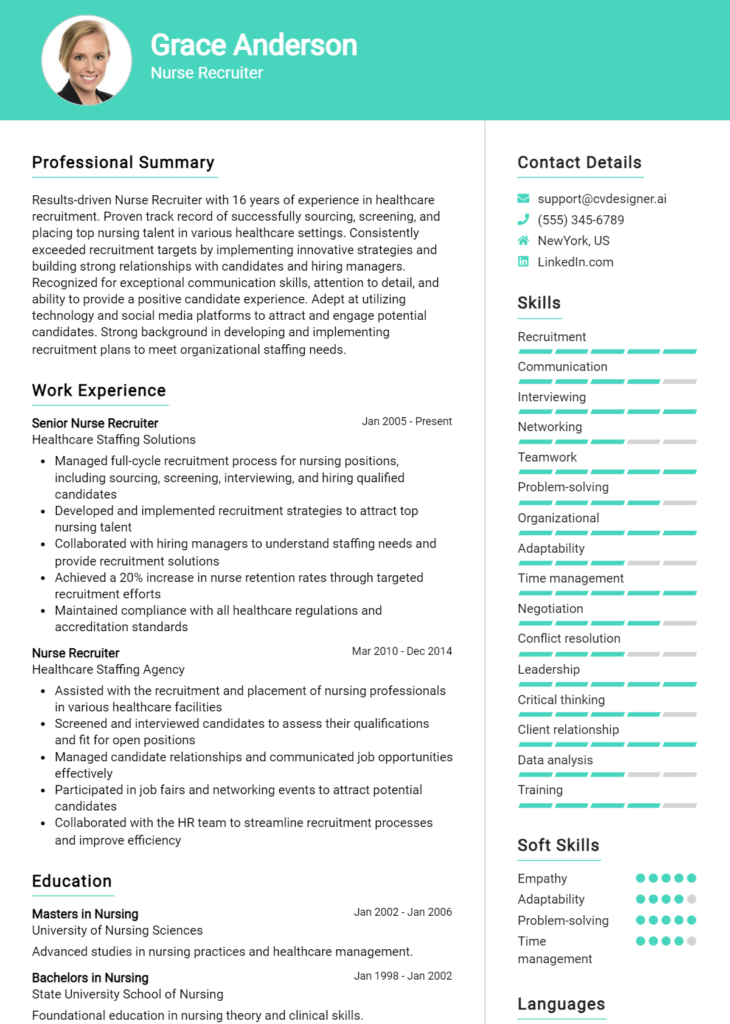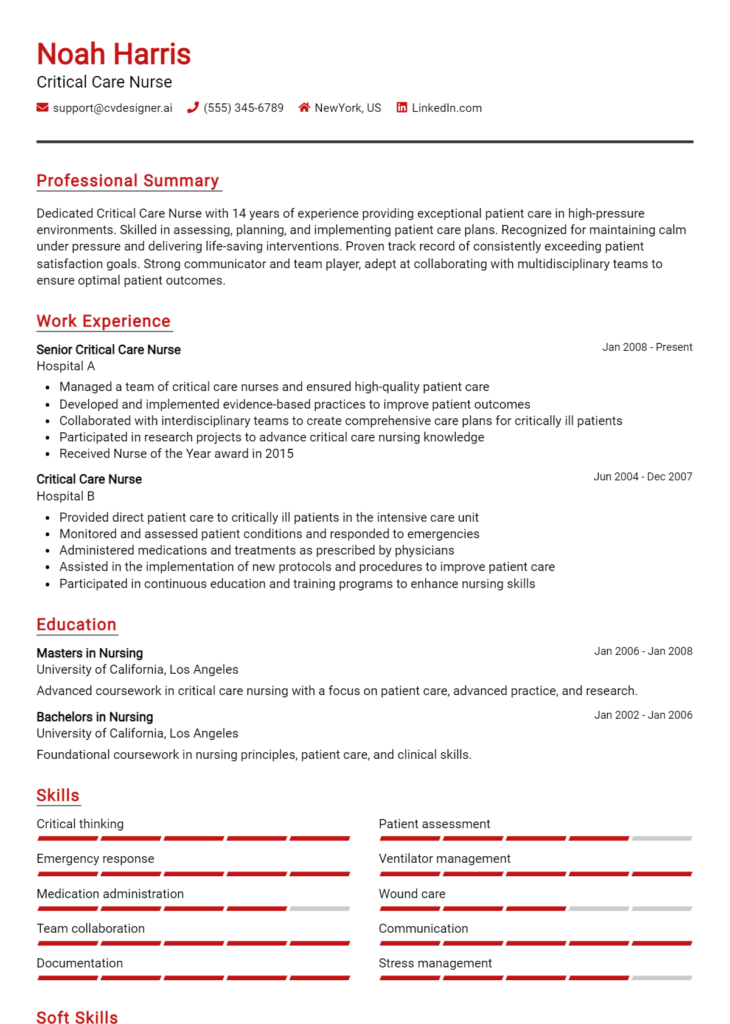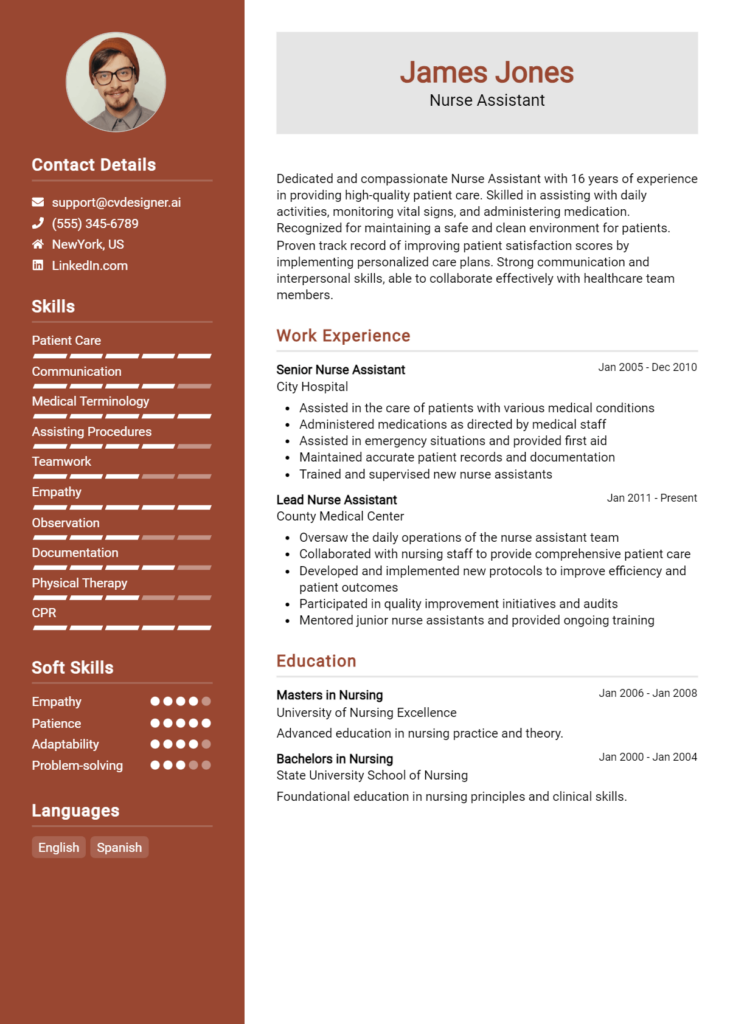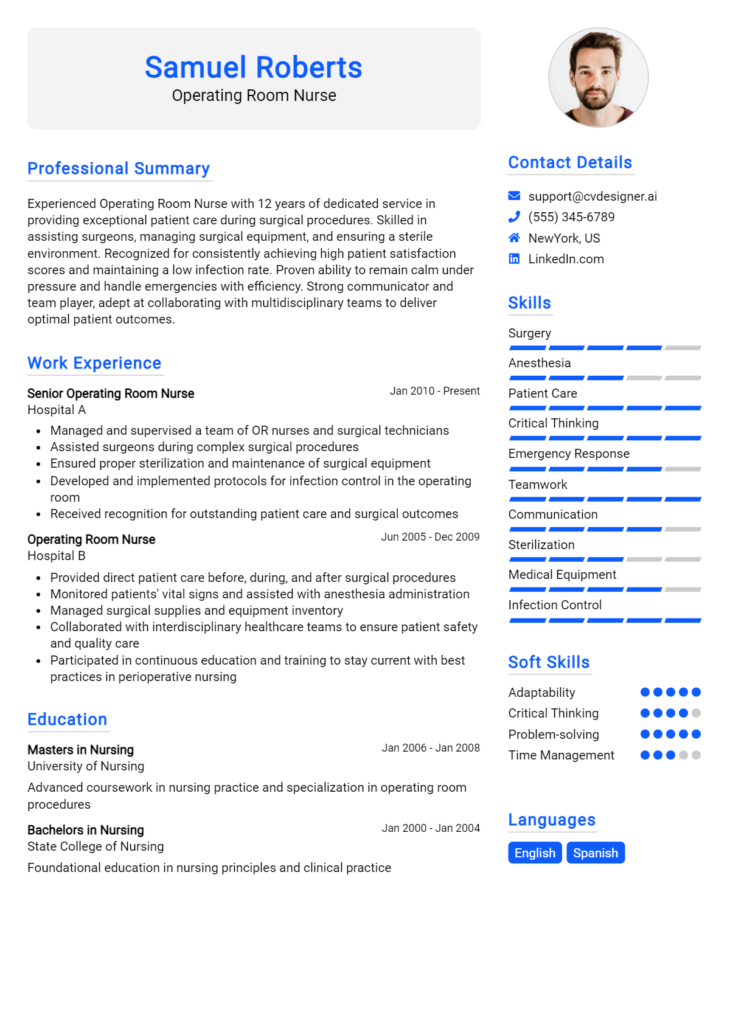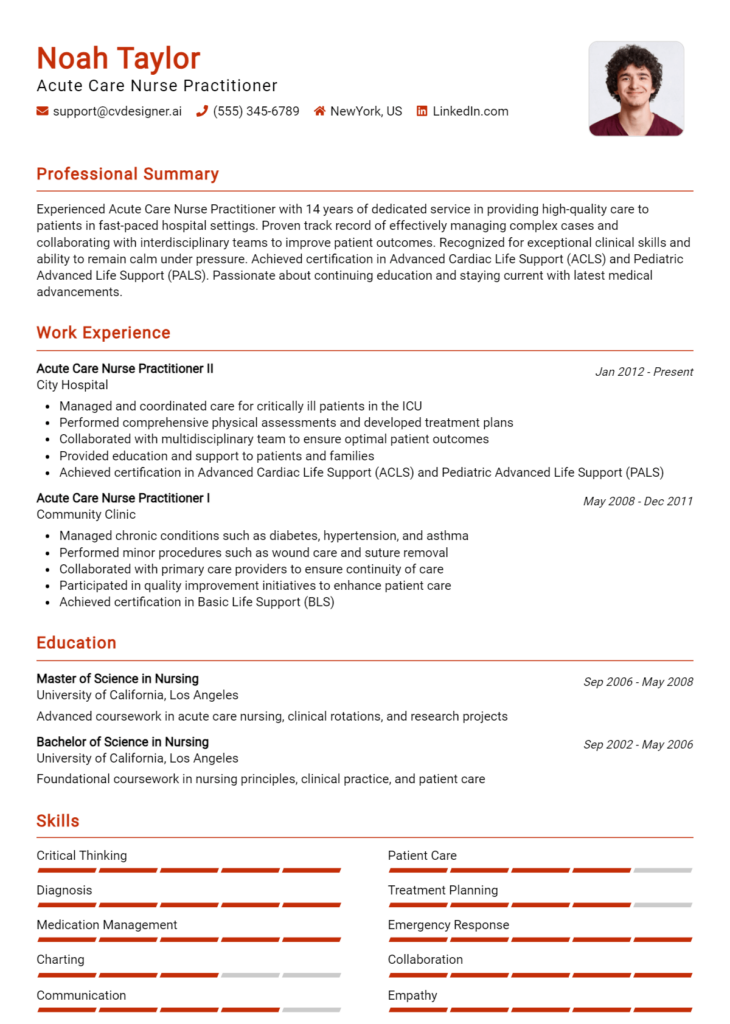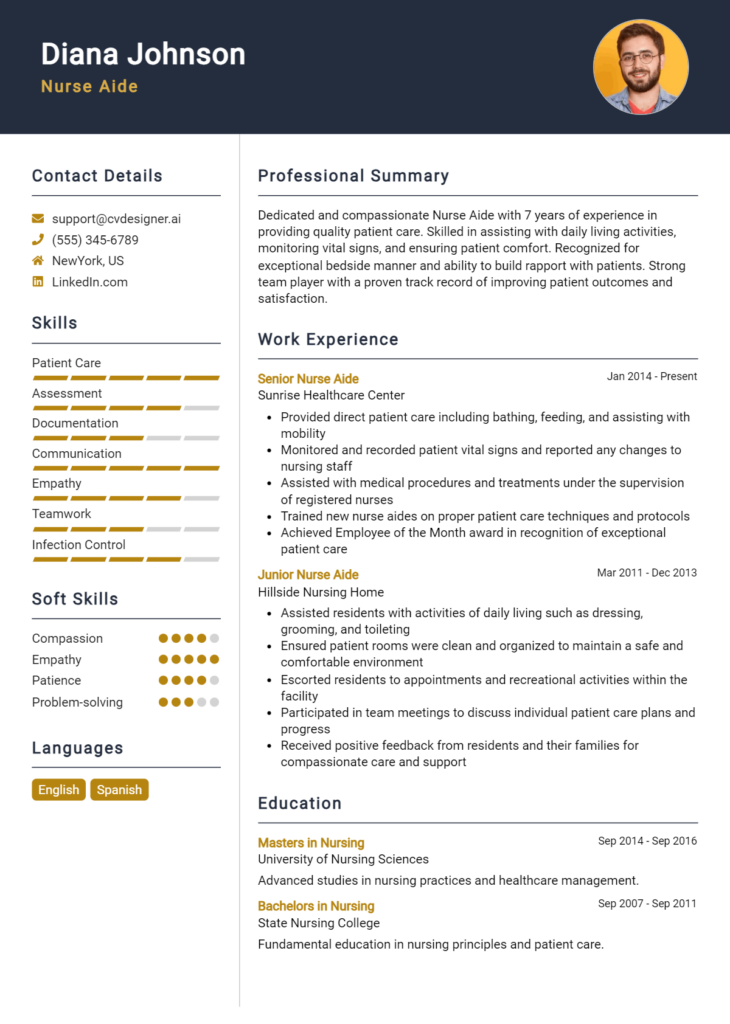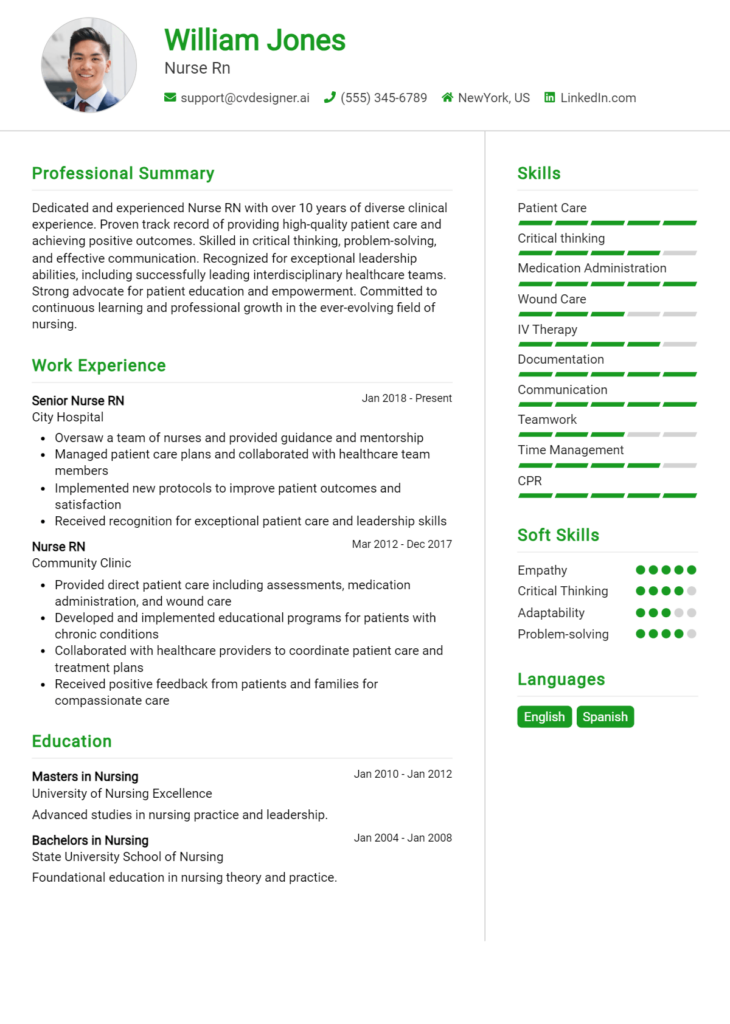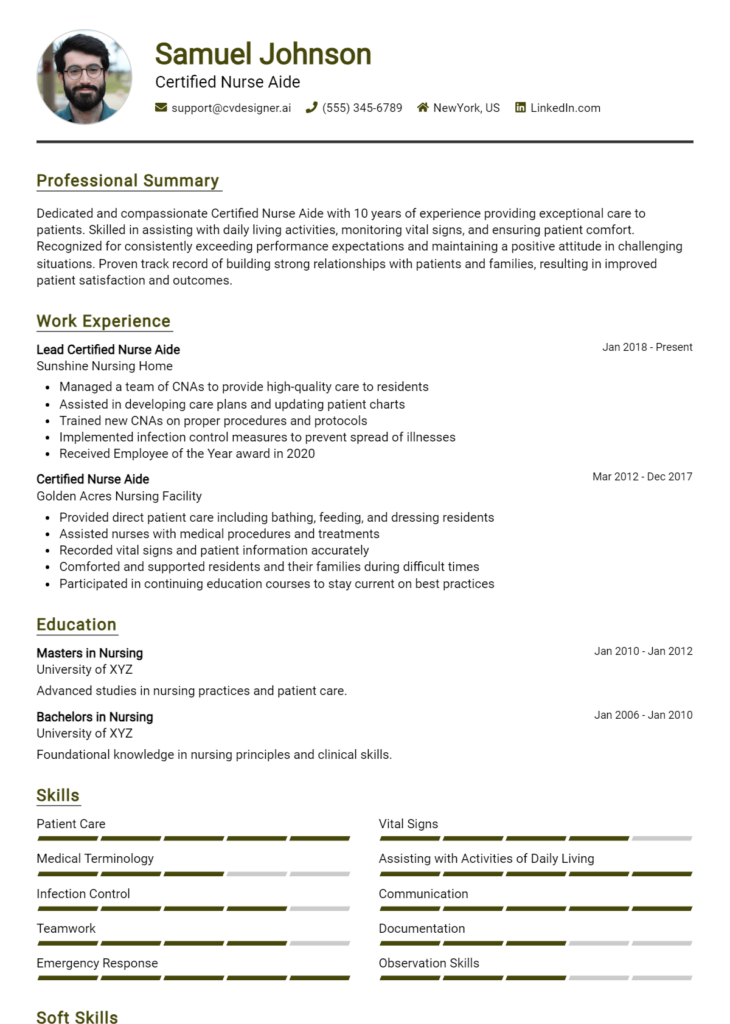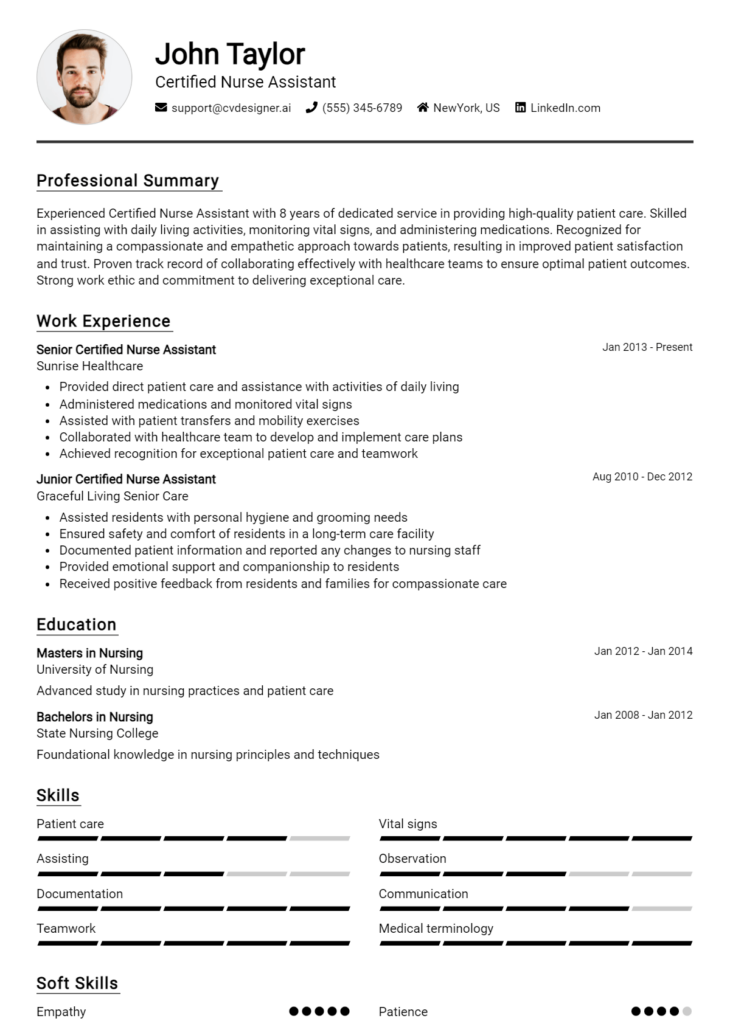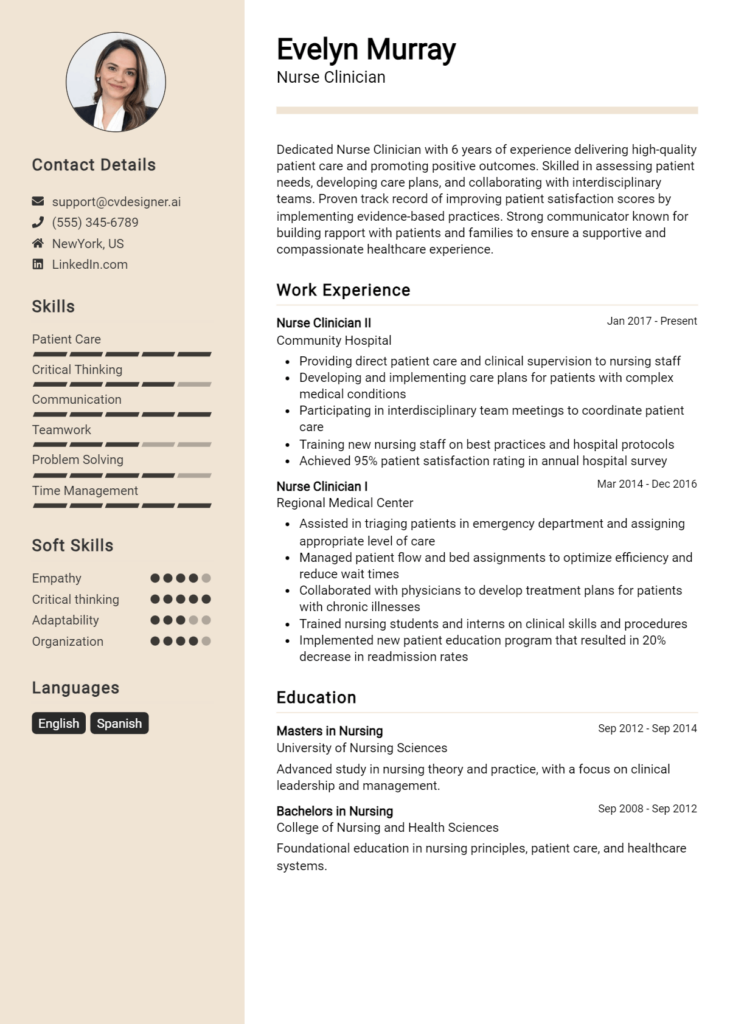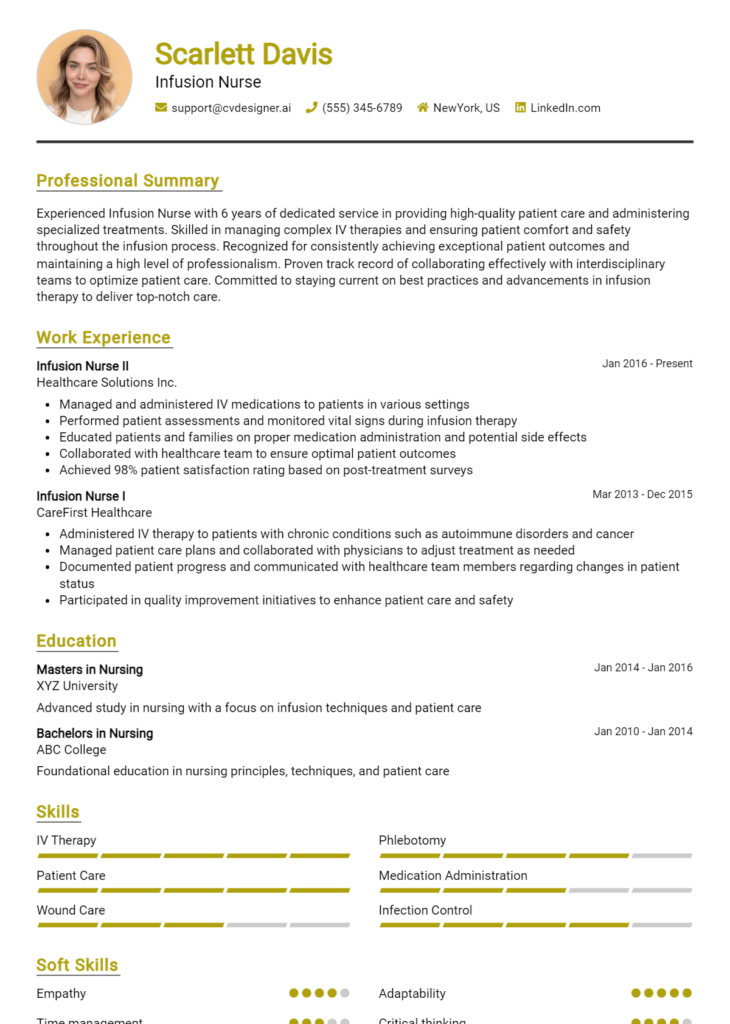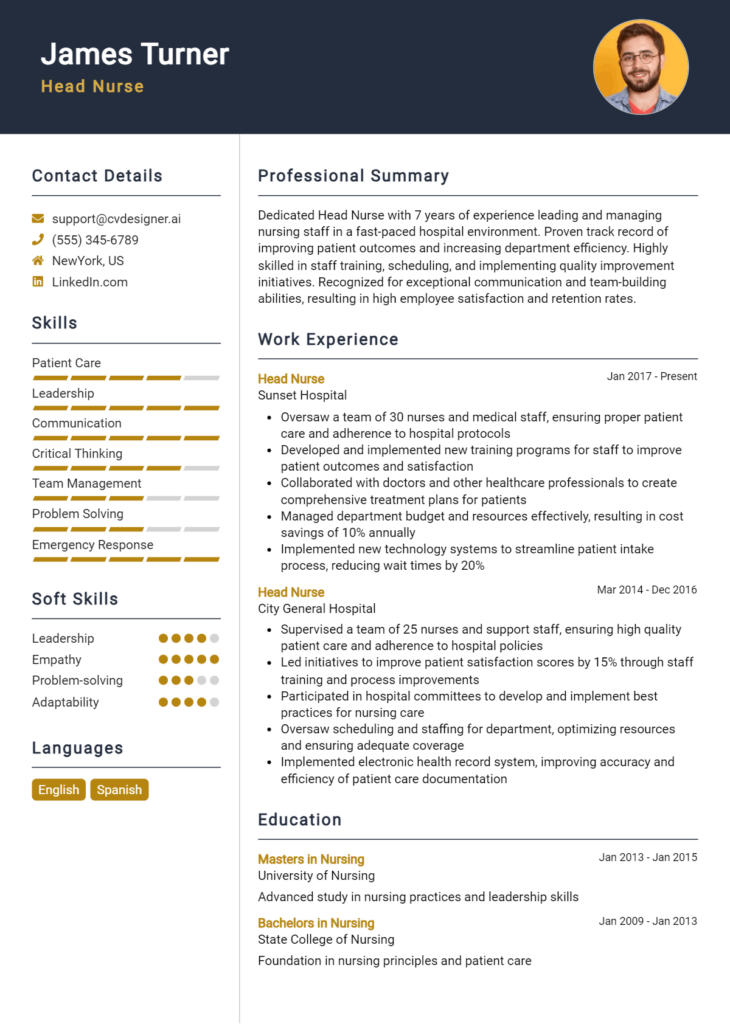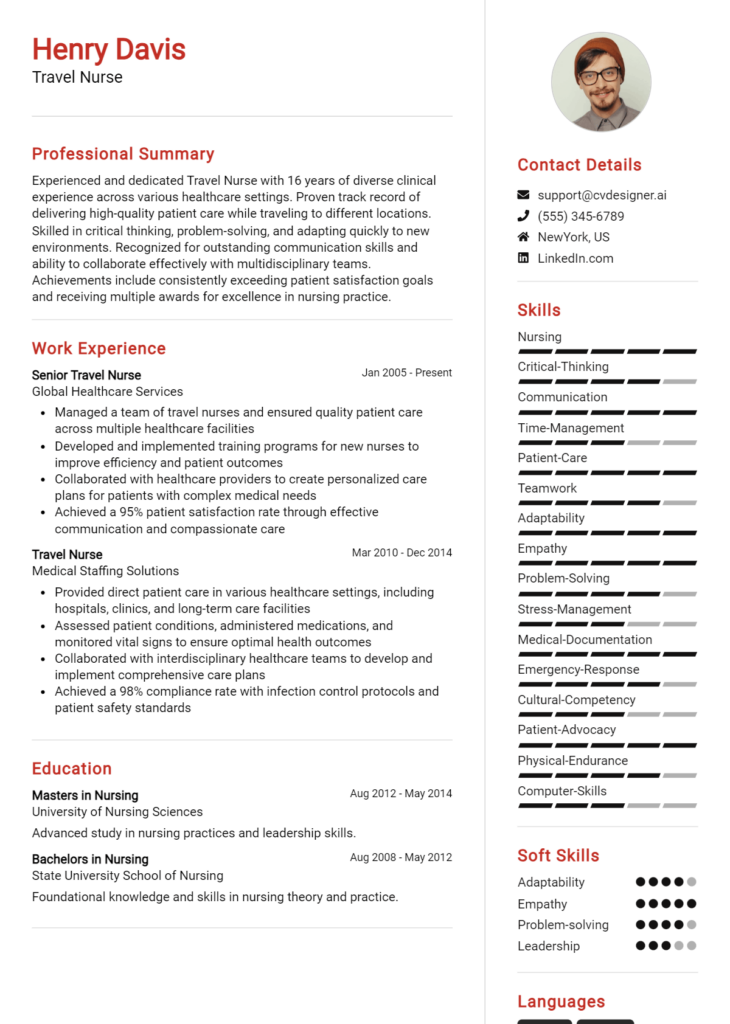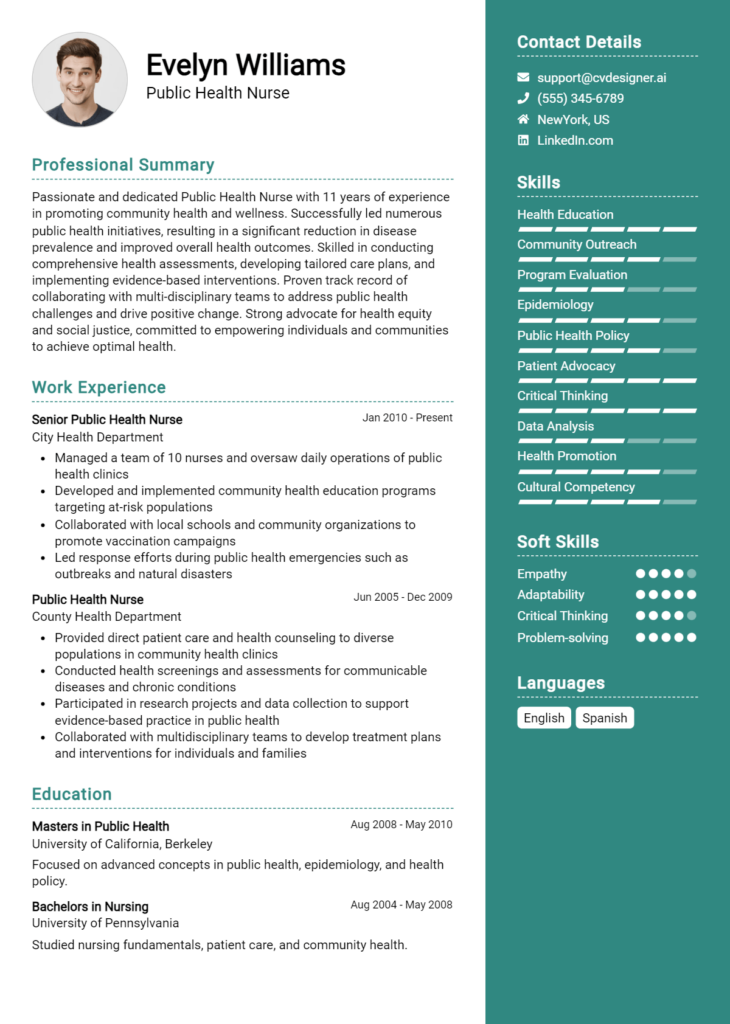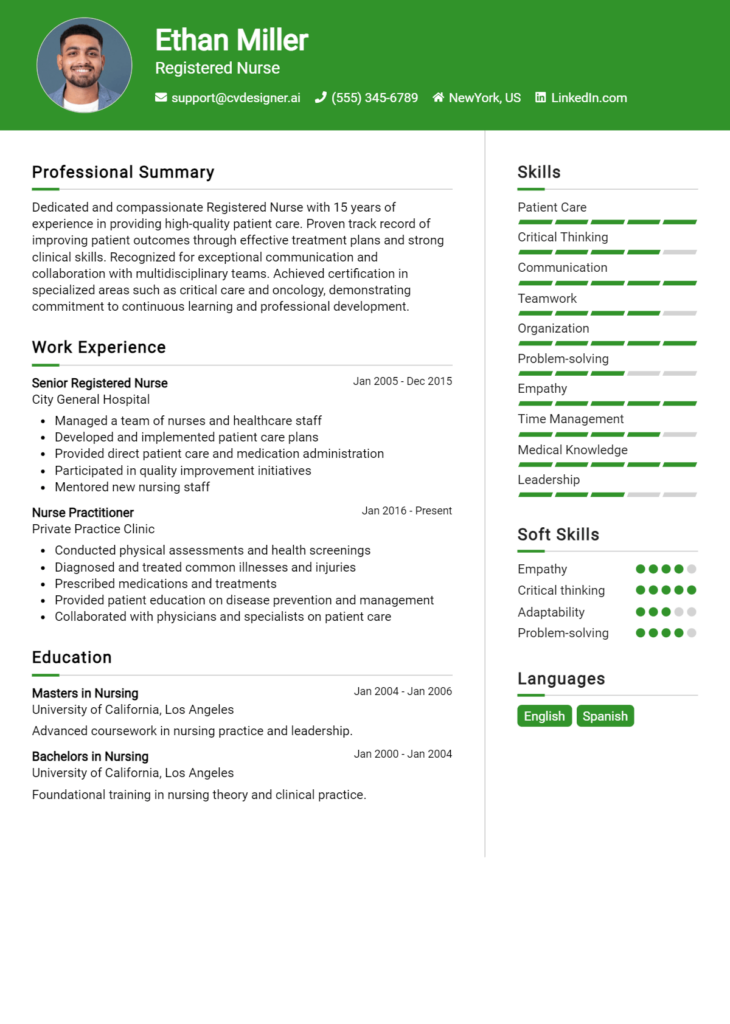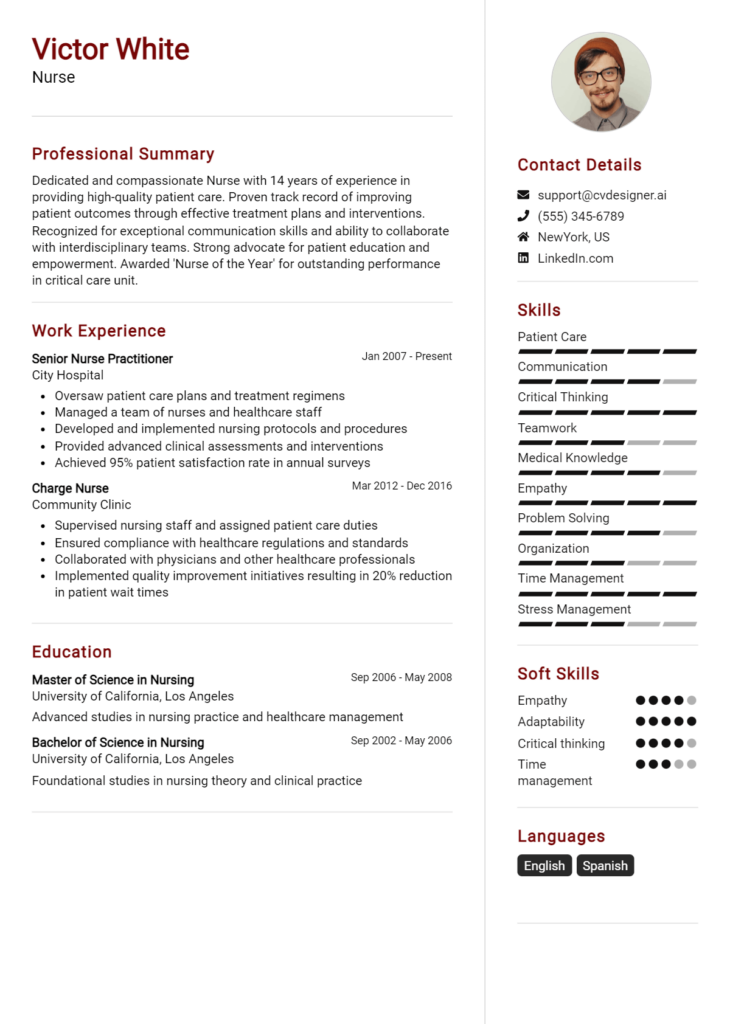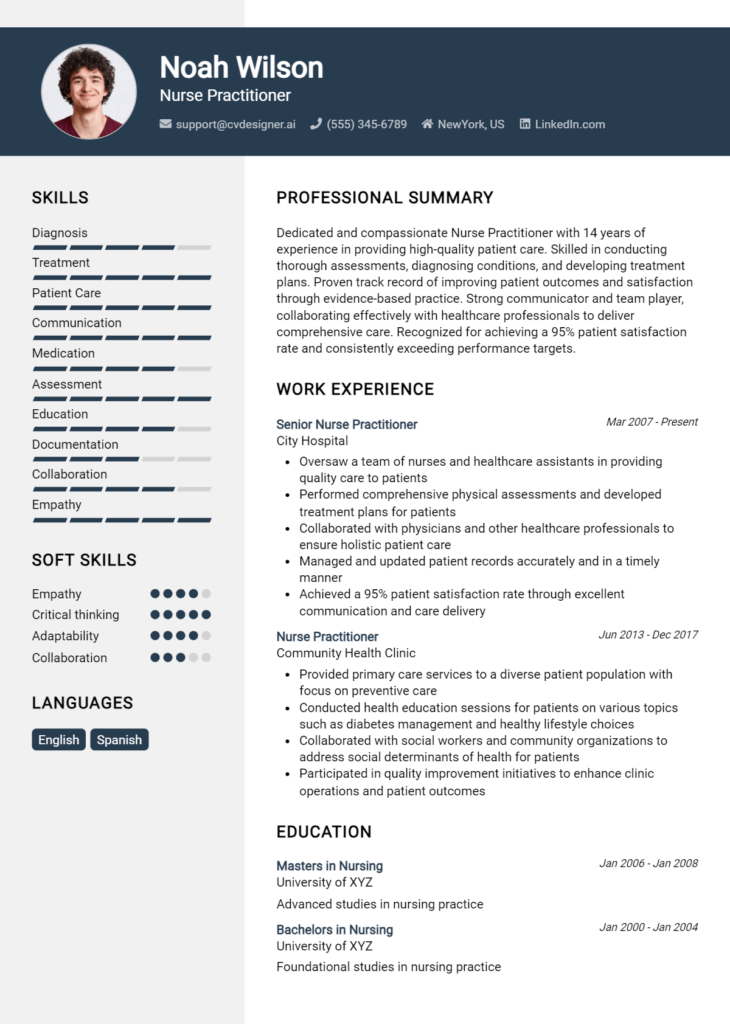Most Popular Clinical Research Nurse Resume Examples
Explore additional Clinical Research Nurse resume samples and guides and see what works for your level of experience or role.
As a Clinical Research Nurse, you are at the forefront of advancing medical science and improving patient care. This pivotal role involves not only the management of clinical trials but also ensuring the safety and well-being of participants while collecting vital data that can lead to groundbreaking treatments. With the demand for skilled professionals in this field soaring, having a well-crafted resume is essential to stand out in a competitive job market. A meticulously designed resume not only showcases your qualifications but also reflects your professionalism and dedication to the field.
In this comprehensive guide to Clinical Research Nurse resume writing, we will cover several key aspects to help you create an impactful resume that captures the attention of hiring managers. You'll explore the core responsibilities and essential skills that define this role, discover the best resume formats to use, and identify common mistakes to avoid. Additionally, we will provide resume examples suitable for various levels of experience, along with expert tips on effective writing techniques. Lastly, you'll learn how to select the right resume templates that align with your personal style and professional aspirations. Whether you are a seasoned Clinical Research Nurse or just starting your career, this guide is designed to empower you with the tools you need to land your dream job.
Key Responsibilities and Skills for a Clinical Research Nurse
As a Clinical Research Nurse, you play a vital role in the execution of clinical trials and research studies. Your key responsibilities encompass a range of activities designed to ensure the safety and well-being of participants while maintaining compliance with regulatory standards.
Key responsibilities include:
- Patient Recruitment and Screening: Identifying and enrolling suitable participants for clinical trials while ensuring informed consent is obtained.
- Participant Monitoring: Observing and recording patients' health status, side effects, and overall progress throughout the study.
- Data Management: Collecting, documenting, and managing clinical data to ensure accuracy and adherence to protocol.
- Collaboration: Working closely with investigators, regulatory bodies, and other healthcare professionals to facilitate smooth trial operations.
- Education and Support: Providing education to participants about the trial procedures and ensuring they understand their rights and responsibilities.
- Compliance and Reporting: Ensuring adherence to Good Clinical Practice (GCP) guidelines and regulatory requirements, as well as reporting any adverse events.
Essential skills required for this position include:
- Strong clinical assessment skills
- Excellent communication and interpersonal abilities
- Attention to detail and strong organizational skills
- Ability to work collaboratively in a multidisciplinary team
- Knowledge of research protocols and regulatory guidelines
- Proficient in data management and analysis software
Highlighting these skills effectively in the resume skills section is crucial for standing out to potential employers. It’s essential to tailor these responsibilities and skills to the specific job description you are applying for, as this demonstrates your alignment with the role and understanding of the clinical research environment.
Consider how these skills could be relevant in creating a strong CV. By showcasing your experiences and emphasizing the skills that match the job requirements, you can enhance your chances of being selected for an interview.
Best Resume Format and Structure for a Clinical Research Nurse
When creating a resume for a Clinical Research Nurse position, it's essential to choose a format that showcases your qualifications, experience, and skills effectively. The most commonly recommended formats are the chronological and combination formats. Here’s a detailed guide on how to structure your resume, including key sections to include and tips for each.
Contact Information
- Name: Your full name should be prominently displayed at the top of your resume.
- Phone Number: Include a professional phone number where you can be reached.
- Email Address: Use a professional email address that includes your name.
- LinkedIn Profile: If applicable, include a link to your LinkedIn profile.
- Location: You may include your city and state, but it's not necessary to provide your full address.
Professional Summary
Craft a concise summary (2-4 sentences) that highlights your experience, skills, and what you bring to the role. Focus on your clinical research experience, nursing background, and any relevant specializations. Tailor this section to reflect the specific job requirements.
Example: "Dedicated Clinical Research Nurse with over 5 years of experience in managing clinical trials and providing patient care. Proficient in developing research protocols and ensuring regulatory compliance. Strong communicator with a proven ability to collaborate with multidisciplinary teams."
Work Experience
List your work experience in reverse chronological order, starting with your most recent position. Include the following for each job:
- Job Title
- Employer Name
- Location
- Dates of Employment (Month/Year format)
- Key Responsibilities and Achievements: Use bullet points to describe your duties and highlight any accomplishments. Emphasize your role in clinical trials, patient assessments, and data collection.
Example:
- Clinical Research Nurse
- XYZ Research Institute, City, State
- January 2020 – Present
- Managed Phase II clinical trials for oncology patients, ensuring adherence to protocols.
- Conducted patient assessments and collected data for analysis, contributing to a 30% increase in patient retention.
Education
List your educational qualifications in reverse chronological order. Include:
- Degree Obtained
- Institution Name
- Location
- Graduation Date (Month/Year)
Example:
- Bachelor of Science in Nursing (BSN)
- University of Health Sciences, City, State
- Graduated: May 2018
Skills
Include a skills section that highlights both hard and soft skills relevant to the Clinical Research Nurse role. Use bullet points for easy readability.
Example Skills:
- Clinical Trial Management
- Patient Assessment
- Regulatory Compliance
- Data Analysis
- Strong Communication Skills
- Team Collaboration
Certifications
List any relevant certifications that enhance your qualifications as a Clinical Research Nurse. Include the certification name, certifying body, and date obtained.
Example:
- Certified Clinical Research Coordinator (CCRC)
- Association of Clinical Research Professionals
- Obtained: July 2021
Additional Sections (Optional)
Depending on your experience, you may consider adding sections such as:
- Professional Affiliations: Memberships in nursing or clinical research organizations.
- Publications: Any relevant research papers or articles you have authored or contributed to.
- Volunteer Experience: Related volunteer work that showcases your commitment to clinical research or patient care.
Format Tips
- Font Choice: Use a clean, professional font (e.g., Arial, Calibri) in a readable size (10-12 points).
- Bullet Points: Use bullet points for lists to enhance readability.
- Consistency: Maintain consistent formatting throughout the document in terms of font sizes, styles, and spacing.
- Length: Aim for a one-page resume unless you have extensive experience that justifies two pages.
The resume format you choose should complement your cover letter, which can follow a similar structure. Ensure that your cover letter expands on the points made in your resume, providing deeper insights into your experiences and motivations for applying to the position. Tailoring both documents to the specific job description will improve your chances of standing out to potential employers.
Writing Tips and Best Practices for a Clinical Research Nurse Resume
When crafting a resume as a Clinical Research Nurse, it’s essential to present your qualifications and experiences in a clear, concise, and professional manner. Tailor your resume to highlight relevant skills and achievements that align with the specific job you are applying for. Use action verbs to convey your responsibilities and accomplishments effectively, and don’t forget to quantify your achievements where possible to demonstrate the impact of your contributions. Incorporating industry-specific keywords will enhance your resume’s visibility to recruiters and applicant tracking systems. Remember, utilizing resume writing tips can help ensure your resume stands out in a competitive field. These same best practices can be applied when drafting your cover letter, allowing you to present a cohesive narrative that showcases your expertise.
- Use action verbs like “managed,” “coordinated,” and “implemented” to describe your roles and accomplishments.
- Quantify your achievements, such as the number of clinical trials managed or the percentage of patient satisfaction improvements.
- Incorporate industry-specific keywords, such as “Good Clinical Practice (GCP)” or “Informed Consent,” to align with job descriptions.
- Tailor your resume for each position, emphasizing the most relevant experiences and skills for the role.
- Keep your formatting clean and professional, ensuring easy readability with consistent fonts and bullet points.
- Include a summary statement at the top that encapsulates your experience and career goals in clinical research.
- Highlight certifications and training relevant to clinical research, such as Clinical Research Coordinator (CRC) or Clinical Research Associate (CRA) certifications.
- Ensure that your resume is free of spelling and grammatical errors to present a polished and professional image.
Common Mistakes to Avoid in a Clinical Research Nurse Resume
Creating a standout resume as a Clinical Research Nurse is crucial in a competitive job market. However, many candidates make common mistakes that can hinder their chances of landing an interview. To ensure your resume effectively showcases your qualifications and experiences, it's essential to avoid these pitfalls. Here are some common mistakes to watch out for:
- Overloading the resume with excessive information, leading to clutter and confusion.
- Using generic descriptions that do not highlight specific skills or accomplishments relevant to clinical research.
- Failing to tailor the resume to the specific job description, missing out on key qualifications that employers seek.
- Neglecting to include relevant certifications or licenses that are critical for a Clinical Research Nurse role.
- Writing in long paragraphs instead of using bullet points for easy readability.
- Ignoring the importance of quantifying achievements, such as the number of trials managed or patients enrolled.
- Omitting essential contact information or providing incorrect details.
- Using outdated or unprofessional formatting that detracts from the content.
- Not proofreading for grammatical errors or typos, which can create a negative impression.
- Skipping the inclusion of soft skills, such as communication and teamwork, which are vital in clinical research settings.
For more detailed insights, consider reviewing the common mistakes to avoid in a resume. Additionally, don't forget to explore common cover letter mistakes that should also be avoided to enhance your overall application.
Sample Clinical Research Nurse Resumes
A Clinical Research Nurse plays a critical role in the healthcare industry by supporting clinical trials and ensuring the safety and well-being of participants. This position requires a mix of clinical expertise, research knowledge, and patient interaction skills. Below are three sample resumes tailored for different experience levels in the Clinical Research Nurse field. These examples can serve as a guide for crafting your own resume, whether you are an experienced professional, an entry-level candidate, or looking to change careers.
Experienced Clinical Research Nurse Resume
Jane Doe, RN, BSN
[City, State]
[Phone Number]
[Email Address]
PROFESSIONAL SUMMARY
Dedicated Clinical Research Nurse with over 8 years of experience in conducting clinical trials, patient recruitment, and data management. Proven ability to maintain high standards of patient safety and compliance with regulatory requirements. Strong interpersonal skills with a commitment to improving patient outcomes.
PROFESSIONAL EXPERIENCE
Clinical Research Nurse
ABC Research Institute, City, State
March 2015 – Present
- Managed over 20 clinical trials in oncology, cardiovascular, and neurology, ensuring adherence to protocols and regulatory standards.
- Coordinated patient recruitment and retention strategies, resulting in a 30% increase in participant enrollment.
- Conducted patient assessments and monitored treatment responses, providing education and support throughout the trial process.
- Collaborated with multidisciplinary teams to analyze trial data and prepare reports for regulatory submission.
Staff Nurse
XYZ Hospital, City, State
June 2012 – February 2015
- Provided direct patient care in a high-acuity medical-surgical unit, utilizing strong clinical assessment skills.
- Collaborated with healthcare teams to develop and implement individualized care plans for patients.
- Trained and mentored new nursing staff in clinical protocols and best practices.
EDUCATION
Bachelor of Science in Nursing (BSN)
University of Health Sciences, City, State
Graduated: May 2012
CERTIFICATIONS
- Certified Clinical Research Coordinator (CCRC)
- Basic Life Support (BLS)
- Advanced Cardiac Life Support (ACLS)
Entry-Level Clinical Research Nurse Resume
John Smith, RN
[City, State]
[Phone Number]
[Email Address]
PROFESSIONAL SUMMARY
Enthusiastic and compassionate Registered Nurse with a Bachelor’s degree in Nursing and a strong interest in clinical research. Eager to leverage nursing skills and knowledge in a clinical research setting to contribute to advancing medical science and improving patient care.
EDUCATION
Bachelor of Science in Nursing (BSN)
University of Nursing, City, State
Graduated: May 2023
CLINICAL EXPERIENCE
Nursing Intern
Local Community Hospital, City, State
January 2023 – April 2023
- Assisted in patient care across various departments, including emergency, pediatrics, and geriatrics.
- Conducted patient assessments, collected vital signs, and documented medical histories under supervision.
- Participated in patient education initiatives, helping to improve understanding of treatment plans.
Volunteer
Health Awareness Campaign, City, State
September 2022 – December 2022
- Supported community health screenings and educational workshops.
- Collaborated with healthcare professionals to provide resources and information to underserved populations.
CERTIFICATIONS
- Registered Nurse (RN) License
- Basic Life Support (BLS)
Career Changer Clinical Research Nurse Resume
Emily Johnson
[City, State]
[Phone Number]
[Email Address]
PROFESSIONAL SUMMARY
Dynamic professional transitioning from a successful career in pharmaceutical sales to Clinical Research Nursing. Possesses strong communication skills and a deep understanding of the clinical trial process, patient care, and data management. Committed to delivering high-quality care and ensuring patient safety.
PROFESSIONAL EXPERIENCE
Pharmaceutical Sales Representative
XYZ Pharmaceuticals, City, State
January 2018 – August 2023
- Developed and maintained relationships with healthcare providers to promote new drug therapies, achieving top sales in the region.
- Conducted educational presentations on clinical trial participation and benefits to healthcare professionals.
- Collaborated with clinical research teams to identify potential sites and assess feasibility for upcoming trials.
EDUCATION
Bachelor of Science in Biology
University of Science, City, State
Graduated: May 2017
CLINICAL EXPERIENCE
Clinical Volunteer
Local Medical Center, City, State
June 2023 – Present
- Assisted in patient interactions and data collection for ongoing clinical studies.
- Engaged in ongoing training to understand clinical trial protocols and regulations.
CERTIFICATIONS
- Basic Life Support (BLS)
- Clinical Research Associate (CRA) Certification (in progress)
For more inspiration, explore additional resume templates that cater to various styles and formats. Additionally, corresponding cover letter examples can complement your resume and help create a comprehensive job application package.
Checklist for a Clinical Research Nurse Resume
- Proofread for Errors: Carefully check for spelling, grammar, and punctuation mistakes. Consider reading your resume aloud or using a text-to-speech tool to catch errors you might otherwise overlook.
- Check for Consistency: Ensure that your font style, size, and formatting are uniform throughout the document. Consistency in headings, bullet points, and spacing enhances readability.
- Tailor Your Resume: Customize your resume for each job application by highlighting relevant experience, skills, and keywords from the job description. This will make your application stand out to hiring managers.
- Highlight Relevant Experience: Ensure that your clinical research experience, including trials conducted, patient interactions, and any regulatory knowledge, is clearly outlined and easily identifiable.
- Include Certifications and Training: List any relevant certifications, such as Good Clinical Practice (GCP), Clinical Research Coordinator (CRC), or Clinical Research Associate (CRA) certifications, prominently.
- Quantify Achievements: Where possible, include metrics or specific outcomes related to your work, such as the number of trials managed or improvements in patient recruitment rates.
- Use Action Verbs: Start bullet points with strong action verbs (e.g., "coordinated," "managed," "assisted") to convey your contributions effectively and dynamically.
- Optimize for ATS: Ensure your resume is ATS-friendly by avoiding excessive graphics or unusual fonts, and by using standard headings and keywords relevant to the clinical research field.
- Seek Feedback: Before finalizing your resume, consider asking a colleague or mentor in the medical field to review it and provide constructive feedback.
- Use an AI Resume Builder: To ensure your resume is well-organized and visually appealing, consider using an AI resume builder. This can help streamline the design process and enhance the overall presentation.
A similar checklist can be followed for creating a CV or cover letter.
Key Takeaways for a Clinical Research Nurse Resume Guide
In conclusion, crafting a strong resume as a Clinical Research Nurse is essential to showcase your specialized skills and experience effectively. By utilizing the examples and tips provided in this guide, you can create a compelling resume that highlights your qualifications and stands out to potential employers. We encourage you to take the next step in your job search by downloading a professionally designed resume template from resume templates, or explore our tailored cover letter templates at cover letter templates. For those looking for a more interactive approach, our best resume maker can help you create a polished document with ease. Remember, applying similar guidelines will also aid in developing an impressive CV and crafting a winning cover letter. Take these actionable steps today to enhance your application materials and increase your chances of landing your ideal position in the clinical research field.
